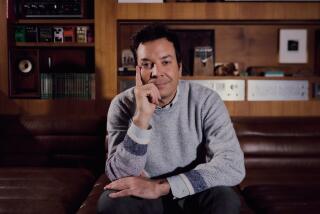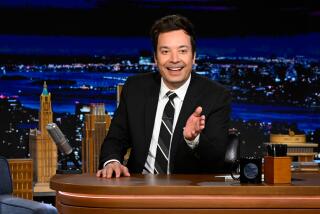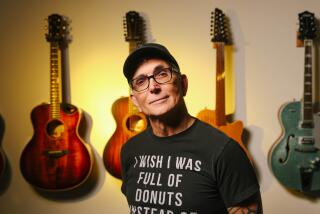Standards’ Generational Spin
- Share via
Perhaps it was the announcement that a colleague, pianist Kenny Kirkland, had died earlier last week in New York that so inspired keyboardist John Beasley’s quartet at Steamers Cafe in Fullerton on Friday. The first set was particularly intense and decidedly emotional.
Kirkland was in the Branford Marsalis edition of “The Tonight Show” band, toured with Sting and was a member of Wynton Marsalis’ group of the early ‘80s. The passing of the 43-year-old pianist, a strong presence on the local scene during his L.A. years, underscores the aging of the much-heralded, Marsalis-led young lions of the early ‘80s. The music performed by Beasley and his compatriots--current “Tonight Show” band members Ralph Moore on saxophone, Bob Hurst on bass and Marvin “Smitty” Smith on drums--demonstrated how their approach has matured.
“With Kenny in mind,” as Beasley announced from the bandstand, the group made a generational statement playing a hip selection of tunes from Horace Silver, Sam Jones and Thelonious Monk. The music was given anything but the predictable, revivalist presentation so popular among ‘90s-era young lions. Instead, it was brought up to date with tautly paced tempos, frequent mood changes and solos that moved easily between bebop, hard-bop, swing and avant-garde influences.
*
The best example of this inclusive style was the arrangement of “You and the Night and the Music.” Developed from Hurst’s bass lines the previous week during club dates in West Hollywood, the piece moved through a tense, choppy introduction that built on an ascending bass riff reminiscent of the one from Wayne Shorter’s “Footprints.” Tenor saxophonist Moore faintly traced the melody, then gave a deeply personal statement against Smith’s irrepressible snare and tom-toms. Even as the tempos varied, the music carried an intense, modern-condition feel.
Beasley, the onetime keyboardist for Freddie Hubbard and Miles Davis, reflects a variety of generational influences, incorporating the emphatic chordal clusters of Herbie Hancock, the rhythmic quirkiness of Monk and the lush intelligence of Art Tatum into a highly refined personal voice.
Playing Monk, Beasley didn’t assume Monk’s character or over-dramatize Monk-like moments. Even at its most dissonant, Beasley’s attack had a slide and a smoothness that skimmed across bassist Hurst’s finely polished flooring.
The London-born Moore, a fixture in pianist Cedar Walton’s ensembles and a bandleader with a number of fine CDs out under his own name, played well-crafted lines on “Without a Song,” and short, effective declarations on Monk’s “Friday the 13th.” His reserved, sometimes soft upper register cries, surfacing infrequently during his narratives, were spine-tingling.
*
Smith is another product of his generation, taking the fatherly influences of Billy Higgins, Elvin Jones, Philly Joe Jones and the late Tony Williams somewhere entirely of his own creation. His style is closely tied to the play of his bandmates, constantly mirroring their sounds. The drummer’s apparent ease as he pushed the proceedings belied the rhythms and ever-changing sound he created.
The group struck its deepest moods with Silver’s “Peace,” a tune Beasley dedicated to Kirkland. Far from somber, the song carried uplifting spirits and solos that came with the naturalness of tears. It was one of those rare experiences that reminds us just how moving jazz can be.
More to Read
The biggest entertainment stories
Get our big stories about Hollywood, film, television, music, arts, culture and more right in your inbox as soon as they publish.
You may occasionally receive promotional content from the Los Angeles Times.










